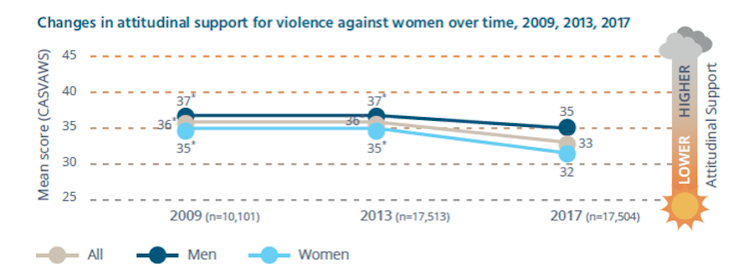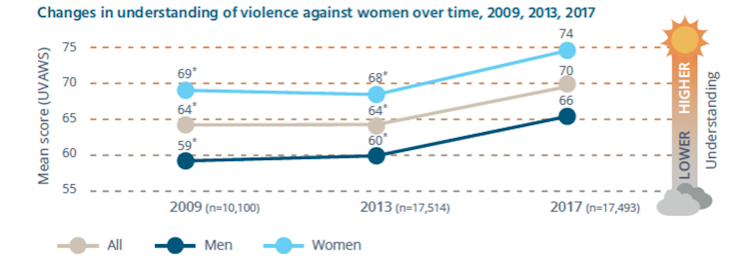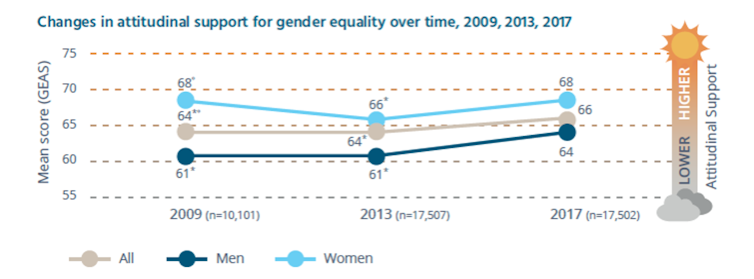Four in ten Australians think women lie about being victims of sexual assault
- Written by Kristin Diemer, Senior Research Fellow, University of Melbourne
Four in ten Australians (42%) think sexual assault accusations are a way of getting back at men, according to the fourth National Community Attitudes Survey (NCAS) on violence against women, released today.
Almost the same proportion (43%) believe women “make up” claims of abuse when going through child custody battles in court.
Yet research shows false allegations are rare. In fact, sexual assault, harassment and domestic violence are _under-reported to police.
Violence against women is common, with two out of every five Australian women experiencing some form of physical or sexual violence since the age of 15, and much of it from a male partner or ex-partner.
NCAS is a federally funded survey conducted by the independent research organisation ANROWS in 2017. It involved 17,500 phone interviews with a representative sample of Australians aged 16 years and older. It’s the third such national survey, allowing us to compare responses with those in 2009 and 2013.
Read more: Rape culture: why our community attitudes to sexual violence matter
It’s not all bad news. The results show a majority of Australians understand that physical assault, emotional abuse and controlling behaviour are forms of violence against women, and are common in our community.
Consistent investment in programs and campaigns has had a positive impact on reducing attitudes that support violence such as minimising and excusing. Out of a score of 100, the average score has reduced from 36 in 2013 to 33 in 2017.
 ANROWS
Blaming the victim
The survey found one in three Australians believe women are partly responsible for relationship violence if they do not leave a violent partner (32%).
Another third (30%) believe if a woman sends a nude image to her partner, she is partly responsible if he shares it without her permission.
When questions are asked about the role of alcohol in relation to violence, 8% attribute responsibility and blame to women who were raped while alcohol- or drug-affected. Some 12% of Australians absolve men of blame if they are alcohol- or drug-affected at the time they perpetrate rape.
Two out of ten Australians (21%) believe because women express themselves sexually in public it’s not surprising men think they can touch them without permission.
Read more:
'Be careful posting images online' is just another form of modern-day victim-blaming
When victim-blaming attitudes are held by a substantial proportion of people, or influential people such as police, judges and health professionals, they can present barriers to victims seeking support or reporting the abuse.
Such attitudes also shift responsibility away from the perpetrators of violence, contributing to a culture in which perpetrator behaviour is at best not clearly condemned, or at worst, is actively condoned.
Disregard for consent
One in ten Australians believe if a woman is drunk and starts having sex with a man, but then falls asleep, it is understandable if he continues to have sex with her.
The survey also asked Australians to respond to a scenario where a woman takes her husband into the bedroom, starts kissing him, then pushes him away, not wanting to continue with sex. More than one in ten (15%) believed her husband would have been justified in having sex with her anyway.
ANROWS
Blaming the victim
The survey found one in three Australians believe women are partly responsible for relationship violence if they do not leave a violent partner (32%).
Another third (30%) believe if a woman sends a nude image to her partner, she is partly responsible if he shares it without her permission.
When questions are asked about the role of alcohol in relation to violence, 8% attribute responsibility and blame to women who were raped while alcohol- or drug-affected. Some 12% of Australians absolve men of blame if they are alcohol- or drug-affected at the time they perpetrate rape.
Two out of ten Australians (21%) believe because women express themselves sexually in public it’s not surprising men think they can touch them without permission.
Read more:
'Be careful posting images online' is just another form of modern-day victim-blaming
When victim-blaming attitudes are held by a substantial proportion of people, or influential people such as police, judges and health professionals, they can present barriers to victims seeking support or reporting the abuse.
Such attitudes also shift responsibility away from the perpetrators of violence, contributing to a culture in which perpetrator behaviour is at best not clearly condemned, or at worst, is actively condoned.
Disregard for consent
One in ten Australians believe if a woman is drunk and starts having sex with a man, but then falls asleep, it is understandable if he continues to have sex with her.
The survey also asked Australians to respond to a scenario where a woman takes her husband into the bedroom, starts kissing him, then pushes him away, not wanting to continue with sex. More than one in ten (15%) believed her husband would have been justified in having sex with her anyway.
 Many Australians seem unclear of what constitutes consent.
Nicolas Thomas
Disregarding consent for touching women, sending nude photos or persisting with sex when a woman does not, or cannot give consent, are criminal offences in Australia.
These findings are significant because they indicate a concerning proportion of Australians are unclear about what constitutes consent, and the line between consensual sex and coercion.
Mistrusting women’s reports
As well as thinking women make up claims of abuse, one quarter (23%) of Australians believe women exaggerate the problem of male violence.
Almost a third (31%) believe that a lot of times women who say they were raped had “led the man on” and then had regrets.
Attitudes that suggest women lie to “get back at men” are particularly concerning in light of the high levels of violence against women, as well as under-reporting of these crimes. The fear of not being believed or taken seriously presents a barrier for women seeking help and support.
Read more:
Australians still trivialise and excuse violence against women
Attitudes are a barometer of socially acceptable behaviour – and changing attitudes is often the first step toward changing behaviour. Attitudes can mean a perpetrator being held to account, instead of his behaviour being ignored. Or a bystander taking action, rather than turning a blind eye.
And now for the good news
One of the pillars of The National Plan to Reduce Violence against Women and their Children 2010 – 2022 has been to support attitude change as a first step to reducing prevalence of violence against women.
The NCAS survey shows there has been an increase in the understanding of violence against women, moving from an average score of 64 to 70, and improvement in support for gender equality moving from an average score of 64 to 66.
Many Australians seem unclear of what constitutes consent.
Nicolas Thomas
Disregarding consent for touching women, sending nude photos or persisting with sex when a woman does not, or cannot give consent, are criminal offences in Australia.
These findings are significant because they indicate a concerning proportion of Australians are unclear about what constitutes consent, and the line between consensual sex and coercion.
Mistrusting women’s reports
As well as thinking women make up claims of abuse, one quarter (23%) of Australians believe women exaggerate the problem of male violence.
Almost a third (31%) believe that a lot of times women who say they were raped had “led the man on” and then had regrets.
Attitudes that suggest women lie to “get back at men” are particularly concerning in light of the high levels of violence against women, as well as under-reporting of these crimes. The fear of not being believed or taken seriously presents a barrier for women seeking help and support.
Read more:
Australians still trivialise and excuse violence against women
Attitudes are a barometer of socially acceptable behaviour – and changing attitudes is often the first step toward changing behaviour. Attitudes can mean a perpetrator being held to account, instead of his behaviour being ignored. Or a bystander taking action, rather than turning a blind eye.
And now for the good news
One of the pillars of The National Plan to Reduce Violence against Women and their Children 2010 – 2022 has been to support attitude change as a first step to reducing prevalence of violence against women.
The NCAS survey shows there has been an increase in the understanding of violence against women, moving from an average score of 64 to 70, and improvement in support for gender equality moving from an average score of 64 to 66.
 Knowledge of violence against women.
ANROWS
Knowledge of violence against women.
ANROWS
 Support for gender equality.
ANROWS
Exploring the detail of the survey questions shows an improvement on 27 of the 36 individual questions asked in both 2013 and 2017.
While there are specific areas of concern, Australians’ knowledge of, and attitudes towards, violence against women and gender equality are gradually improving. Most Australians do not endorse this violence.
Australian governments have invested heavily in campaigns and programs to reduce men’s violence against women over the past ten years and the current NCAS results show that there have been some rewards.
Changing attitudes and improving knowledge takes time, as well as continued policy and program efforts. It’s vital that governments, organisations and communities across Australia keep up the momentum if we are to ultimately see the end of attitudes that allow violence against women to occur. http://ncas.anrows.org.au
This article was co-authored by Violeta Politoff, Senior Researcher for ANROWS on the National Community Attitudes Survey on Violence against Women.
The National Sexual Assault, Family and Domestic Violence Counselling Line – 1800 RESPECT (1800 737 732) – is available 24 hours a day, seven days a week for any Australian who has experienced, or is at risk of, family and domestic violence and/or sexual assault.
Support for gender equality.
ANROWS
Exploring the detail of the survey questions shows an improvement on 27 of the 36 individual questions asked in both 2013 and 2017.
While there are specific areas of concern, Australians’ knowledge of, and attitudes towards, violence against women and gender equality are gradually improving. Most Australians do not endorse this violence.
Australian governments have invested heavily in campaigns and programs to reduce men’s violence against women over the past ten years and the current NCAS results show that there have been some rewards.
Changing attitudes and improving knowledge takes time, as well as continued policy and program efforts. It’s vital that governments, organisations and communities across Australia keep up the momentum if we are to ultimately see the end of attitudes that allow violence against women to occur. http://ncas.anrows.org.au
This article was co-authored by Violeta Politoff, Senior Researcher for ANROWS on the National Community Attitudes Survey on Violence against Women.
The National Sexual Assault, Family and Domestic Violence Counselling Line – 1800 RESPECT (1800 737 732) – is available 24 hours a day, seven days a week for any Australian who has experienced, or is at risk of, family and domestic violence and/or sexual assault.
Authors: Kristin Diemer, Senior Research Fellow, University of Melbourne





